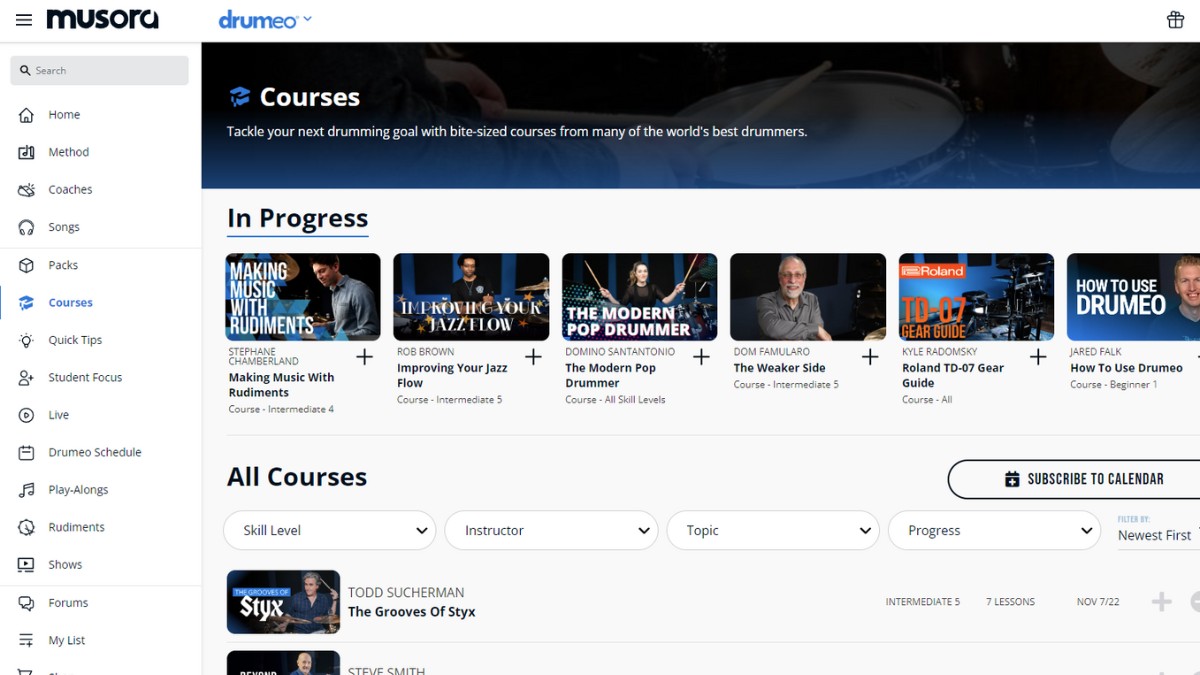Are Drum Lessons Worth It?
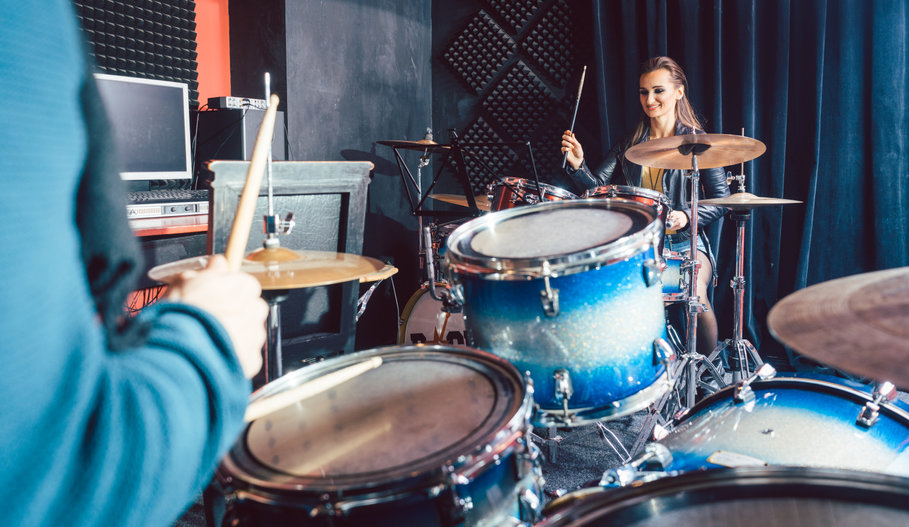
Taking drum lessons is always a good idea no matter what your drumming goals are. Even if you don’t see yourself as a professional drummer, it’s worth your time to learn techniques and fundamentals. A drum teacher can help you map out your progress in an effective manner.
Sure, some drummers may be self-taught. You can learn the instrument on your own by listening to music, but the progress is very slow and limited that way. Eventually, you may get stuck in a rut or develop bad techniques, which might be counterproductive in the long run.
Since drums are a very physical instrument, effective motions are a big part of it. A drum teacher can teach the correct technique and along with it, filter bad habits. It’s important to have a more seasoned drummer critique you every step of the way. Learning from a teacher also means that you have someone to look up to, which provides extra motivation to get better.
There are many different forms of drum lessons. We’re going to be focusing on private one-to-one lessons in this article, but we’re also going to cover group lessons and online drum lessons.
These days there are many different options, and with the internet at your fingertips, finding a good teacher is easier than ever. Especially with platforms like Drumeo where you can find in-depth lessons or courses from some of the best drummers on the planet. Or you can do one-on-one lessons through video calls.
Contents
- At a Glance
- What are the Benefits of Private Drum Lessons?
- What are the Disadvantages of Private Drum Lessons?
- What’s the average price of drum lessons?
- Not All Drum Teachers are Equal
- Online Drum Lessons
- How long should you take drum lessons?
- Group Drum Lessons
- Can drums be self-taught?
- How many hours a day should I practice drums?
- Summary
At a Glance
- Drum lessons are absolutely worth it. Learning the fundamentals and progressing correctly with a drum teacher is the best way to approach drumming.
- Private lessons are the best possible option. The one-on-one approach is great for developing your technique and rooting out mistakes before their inception. However, they do come at a price (usually between $30 to $50 per hour).
- Online lessons are becoming increasingly popular. Platforms like Drumeo offer a complete experience with private sessions, learning songs, techniques, and so much more for a price much more affordable than private lessons.
- Do your research before signing up with a drum instructor for lessons. Many second-rate teachers are looking for a quick buck and will only hurt your learning. Ask for references and choose wisely.
- The learning curve for drums is a never-ending one. While some leave their lessons after a few months, many stick around for years. The important thing is to learn the fundamentals and techniques before deciding on how to proceed.
- Practice is key! Try to practice at least 20 minutes per day or as much as your schedule allows it.
What are the Benefits of Private Drum Lessons?
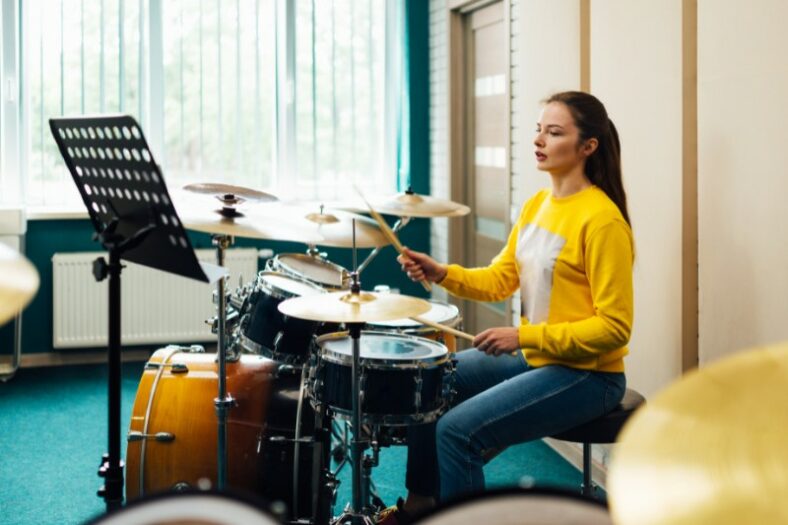
If you can, go for private drum lessons. It’s probably the best mode of learning such a complex instrument since the entire focus of the instructor is on one person – you.
As you’re learning in a one-on-one environment, your teacher can observe you much more closely. There’s someone to constantly critique you for the smallest of things, which, as annoying as it sounds, is something to be grateful for. All of this leaves little room for developing poor techniques and other bad habits.
Private lessons provide a platform for tailor-made sessions which means you learn at your own pace and progress as you want to. Also, you’re more comfortable expressing yourself as it’s just two people. You’re able to ask as many questions as you want and also get to connect with a more seasoned drummer.
What are the Disadvantages of Private Drum Lessons?
Private drum lessons are obviously superior to group lessons but they do come at a price. Not everyone can work their way around it.
First, the cost of private drum lessons is higher than group lessons, and rightfully so. Instructors are devoting their time and energy to one person and expect to be compensated as such. Also, in many cases, the student has to visit the teacher for each session so you can add in the travel time and cost as well.
Second, great teachers are hard to find. Most of them are busy with their music career, including teachers who work at music schools or camps. Even if you do get a hold of one, there’s a chance you will be operating on their time. The schedule, not the length of the session. Private lessons can demand adjustments.
What’s the average price of drum lessons?
Prices of drum lessons depend on several factors. Where you live, who’s the teacher, and how long the classes will be. More experienced teachers generally cost more than less experienced teachers, particularly for private lessons.
On average, drum lessons cost between $30 to $50 per hour. Some teachers might also offer bundle sessions, so it’s worth looking into it.
Not All Drum Teachers are Equal
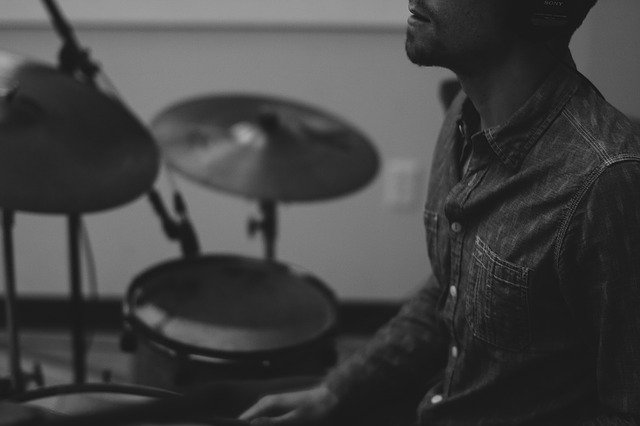
In your search for the right drum teacher, you probably will come across an amateur teacher or a hack, looking to make a quick buck. You should stay away from them as a bad teacher might lead you to develop poor habits which you won’t realize until later. So, you have to make sure you will not be wasting your time and money.
Do your due research before signing up with a teacher. Check out their credentials and play videos. See what bands they have played for and what style they play in. There are differences between jazz-based teachers and rock-based teachers, while there are also teachers who are well-versed in all genres.
A lot depends on your goals too. If you’re a beginner, then any teacher worth their salt will do. If you’re more experienced, look for specific teachers. Plenty of educators offer trial classes. Make use of that and try to figure out if they’re right for you.
Online Drum Lessons
Online drum lessons certainly have their benefits. They are available on-demand and you can get amazing instructional content from some of the best drummers in the world.
For example, Drumeo has some great structured courses for drummers of all levels and I can highly recommend it (read our Drumeo review here).
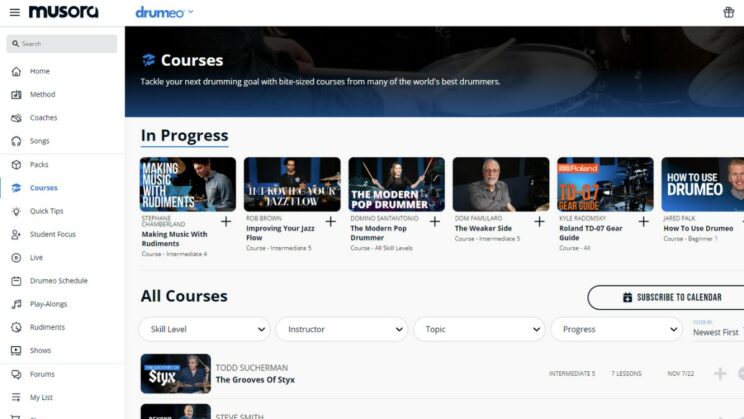
A hybrid approach is to initially take one-on-one lessons to develop form and good technique, get feedback from your instructor, and between classes, go online and hone the skills that you learned in your private sessions. It’s an efficient way of learning an instrument that is learned through repetition.
Also, these days, there’s an ocean of talented drummers giving free lessons online. They might not be in-depth courses, but you can easily learn new things. So, you don’t have to exclusively take private classes for every little thing.
How long should you take drum lessons?
As far as duration is concerned, most private lessons are between 30 minutes to an hour long. Of course, you can decide on the timings as per your needs.
If we’re talking about the longevity of your lessons, it’s very subjective. Students continue to take classes for years while some leave after a few months. The important thing is to build a solid foundation including techniques and theory before you think about progressing on your own.
Drums are a very vast instrument, played in a wide range of genres. The learning curve is a never-ending one. Even the greatest drummers take drum lessons when they’re trying to explore something new because no drummer is a master of every style.
So, if you think your lessons are giving you something valuable, keep on with them. If not, practice on your own and take lessons for specific styles. That way, you won’t be limiting your talents behind the kit.
Group Drum Lessons
Aside from being cost-saving, group lessons provide a more musical environment which is great for beginners. They are a great way to socialize with fellow drummers are you’re surrounded by hungry, budding drummers who also want to get better. They also build a level of competition where you can not only learn from your teacher but also from other students.
Another thing that’s great about group drum lessons is that you’re frequently performing in front of other people. It builds confidence and self-esteem which are so important when playing in front of an audience. And it can give you an extra sense of motivation to perfect your technique.
The flip side is, that for those who aren’t the most social butterflies, group lessons can be intimidating. Even though getting out of your comfort zone is a good thing, pushing too hard might not be so. Group lessons have more students so some find it distracting. Plus, if you find competition to be unhealthy, learning in a one-on-one environment might be better.
Can drums be self-taught?
As high-rated drum lessons are, no hard and fast rule says you have to take them to learn an instrument. If you’re passionate enough, you can always learn drums on your own. Just be disciplined in your progress.
Make sure to either practice in front of a mirror or record yourself practicing. Self-teaching means you’re your own judge. so get your knowledge right. Don’t shy away from critiquing yourself as you run the risk of developing bad habits.
That said, free online lessons have made learning drums on your own much more convenient. Make full use of them and continue exploring. If you do get stuck somewhere, you can always reach out to a teacher.
How many hours a day should I practice drums?
It’s recommended to try to dedicate at least 20 minutes of practice time for drumming per day. Of course, you can have a few days off per week but try to keep yourself disciplined. Practice drums for as long as your schedule allows. If it’s 4 hours a day, wonderful. If not, even a half an hour session works.
The golden rule is that you need at least 10,000 hours of practice to become a master at any skill. However, you can learn the basics of drumming in just a few months.
The key is to put quality over quantity. Utilize your time effectively by making yourself accountable. Keep a planner of what you’re supposed to practice and for how long.
Divide your practice sessions if you feel you can’t sit on your throne for too long. You can really develop as a drummer simply with a pair of drumsticks and a practice pad, and incorporate it with some other activity like watching TV.
At last, don’t forget to have fun. Practice doesn’t have to be tedious. Put your practice to use from time to time, do improvs, and even use songs as a metronome.
Summary
The drums can be a tricky instrument to master. They seem easy to play but more often than not are pretty hard, especially when you get to the intermediate and advanced levels. It is for this reason, that taking drum lessons can be priceless.
With the internet these days, finding a good teacher isn’t the hardest task. You can take in-person lessons, video calls, or take online lessons. It’s all up to what suits you the best. Figure out your drumming goals and continue to get better.


